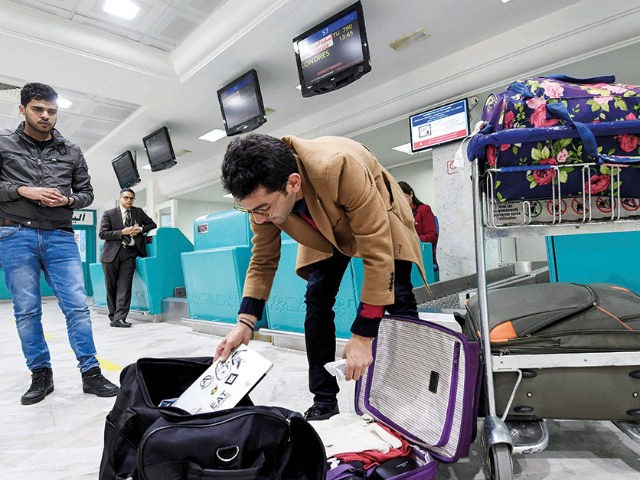The Department of Homeland Security (DHS) is considering implementing a ban on laptops in the cabins of flights from Europe due to terror concerns.
The same ban is already in place for flights departing from ten airports in Muslim-majority Middle Eastern and North African countries based on concerns terror groups in those countries could sneak explosives past existing security checks on large electronic devices. The restriction was put in place in March and applies to all electronics larger than a smartphone.
In an April address at George Washington University’s Center for Cyber and Homeland Security, DHS Secretary John Kelly explained that intelligence suggests terror networks are actively researching ways to bypass aviation safety current countermeasures and secret explosives in laptops and other large electronics.
Kelly and DHS officials met with airline officials on Thursday, reportedly to discuss the possibility the same restrictions would be expanded to certain European airports as well.
In a press release following the meeting, U.S. Travel Association Executive Vice President for Public Affairs Jonathan Grella seemed confident the ban would be extended, calling the announcement “anticipated.”
DHS Spokesman David Lapan tweeted Friday that discussions are ongoing and involve both Congress and European officials:
This development comes as Islamic terrorism has become a daily concern in Europe. At the start of the month, the U.S. State Department warned American travelers to Europe to “always be alert to the possibility that terrorist sympathizers or self-radicalized extremists may conduct attacks with little or no warning.”
The dire warning came as four Islamic terrorist attacks struck Western Europe in as many weeks. France’s President-elect Emmanuel Macron has admitted that terror will be “part of our daily lives for the years to come.”
Once among the safest countries in the world, Western Europe has become a hotspot for terrorist activity in the wake of millions of migrants and so-called “refugees” flooding the continent in the past two years. Germany, whose chancellor, Angela Merkel, was instrumental in inviting the influx, has fallen from twentieth place to fifty-first in a tourist security ranking, driven by terror concerns and migrant-driven crime spikes. France and the United Kingdom are even lower at sixty-seventh and seventy-eighth place, respectively.
European officials appear to be scrambling to address DHS’s concerns. In a letter Thursday to Secretary Kelly, European Union transport Commissioner Violeta Bulc and Commissioner for Migration, Home Affairs and Citizenship Dimitris Avramopoulos wrote:
We propose that meetings are held as a matter of urgency, both at political and technical level, to jointly assess the risk and review possible common measures. … The Commission is keen to work closely together with the U.S. government on identifying the best possible ways to mitigate any security concerns that may have been identified, including through further testing and improving detection capabilities.
Should DHS decides on the laptop ban for European flights, it will not affect flights leaving to Europe from the United States.

COMMENTS
Please let us know if you're having issues with commenting.